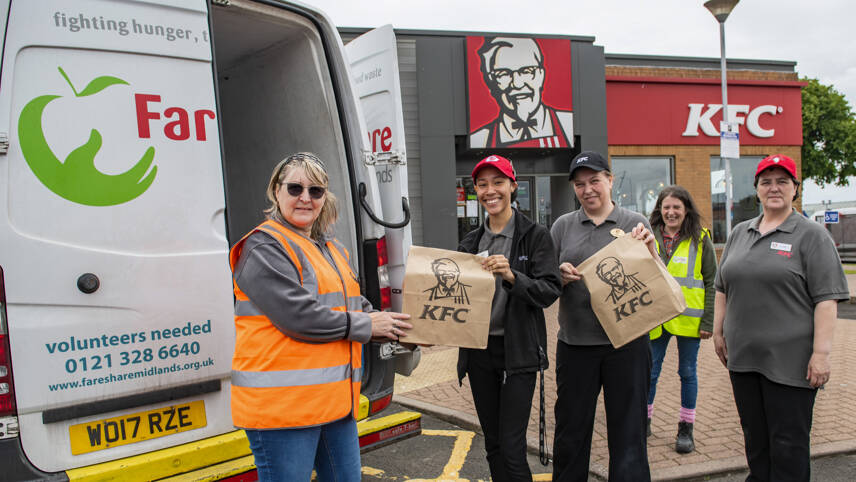Register for free and continue reading
Join our growing army of changemakers and get unlimited access to our premium content

Image: KFC/SWNS
The fast-food giant piloted a tie-up with FareShare across 20 restaurants from late last year. Over an eight-month trial period, the equivalent of 27,500 meals were made available to 22 community groups across the Midlands, the North East of England and Essex. Each participating restaurant made 69 kilograms of food available to FareShare each week during the pilot.
FareShare is perhaps best known for providing food directly to community groups using regular planned deliveries. The pilot with KFC saw a slightly different approach being taken. Community groups were notified via an app, called FareShare Go, of what foods were available in real-time from their local KFC branch. They could then choose whether to accept the offer and set the food aside for collection. Each KFC branch had three collection dates booked each week.
Using learnings from this pilot, all 1,000 of KFC UK & Ireland’s restaurants will begin redistributing unsold food and drink through FareShare by the end of the year. The business has stated that it intends to ensure all unsold food is redistributed to local communities, including frozen products as well as hot and ambient food and drinks.
“We’ve seen more and more people in the local communities that we serve being plunged into food insecurity and, as the cost of living crisis intensifies, it is more important than ever that we make sure any surplus food gets to the people who need it most,” said KFC’s chief corporate affairs and sustainability officer Jenny Packwood.
“We want to move fast and hard on rolling out our food redistribution programme by the end of the year, and across all of our restaurants, because we cannot sit by while our communities suffer… . By redistributing our surplus fried chicken, we’ll not only be tackling food insecurity, but we’ll also be taking an important step towards our goal of become a fully circular, zero-waste business by 2035.”
The Food Foundation estimates that 13.8% of UK households experienced moderate or severe food insecurity in April 2022, up from 8.8% in January. Food insecurity is defined as a temporary or ongoing lack of reliable access to affordable, nutritious, diverse food.
Click here to read edie’s recent feature on the ways in which businesses can tackle food insecurity and their environmental impact simultaneously, by setting up new ways of managing surplus products and waste.
EG Group
In related news, EG Group, which operates hundreds of convenience stores at petrol stations across the UK and Ireland, has confirmed that it has redistributed 1.26 million bags of food through a partnership with Too Good to Go.
Too Good to Go enables companies to list bags of surplus food products on its app, which customers can then purchase at a significant discount. These are called ‘magic bags’. On average, they cost one-third of the RRP of their contents.
EG Group partnered with Too Good to Go in 2018 for its petrol stations in France. In 2020, locations in the UK, Netherlands, Germany and Belgium were added. Of the 1.26 million redistributed ‘Magic Bags’, one million were sold in the UK and 260,000 in mainland Europe.
“We have seen a spike in the number of users in recent months, as more and more people monitor household spending closely, and hope that this partnership goes some way in supporting families who are looking for ways to combat the increasing cost of living,” said EG Group’s head of ESG and sustainability Amina Batool.
A report published this month by Capgemini reveals that consumer consciousness around food waste has more than doubled in the UK since 2019. While rising food prices are the main driver of awareness at present, supply chain issues cause by lockdown also focused minds – as did campaigns around the environmental impacts of food waste.
Capgemini’s survey found that 62% of British customers want retailers to do more to tackle food waste, with 90% saying they would prefer to buy from businesses that are taking action on food waste. As well as redistributing food, shoppers want to see clear date labels, packaging that protects food and innovative products.
On the business side of things, Capgemini found that only 15% of organisations globally with a commitment to halve food waste by 2030 are on track to deliver. Businesses reported a lack of in-house skills for key activities, such as measuring food expiry trends and developing innovative packaging. Another common barrier was found to be poor regulatory support for things like changing labelling or scaling food redistribution partnerships while complying with health and safety requirements.


Please login or Register to leave a comment.